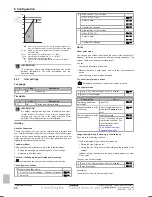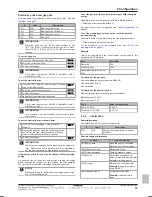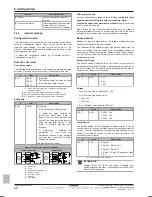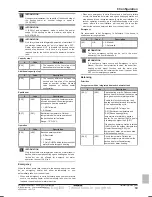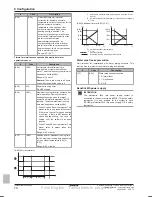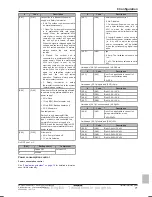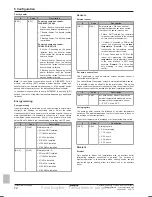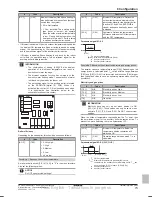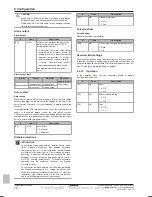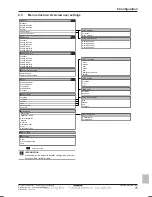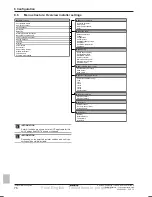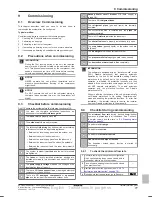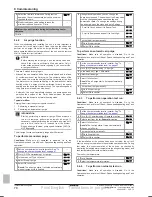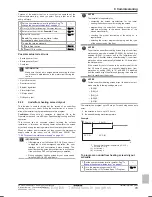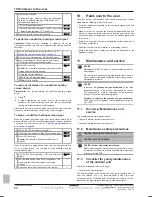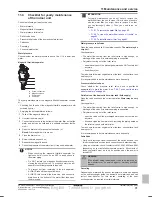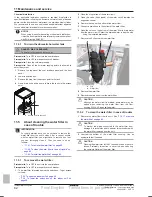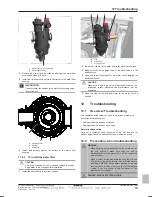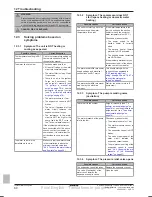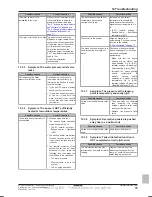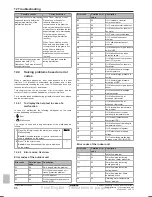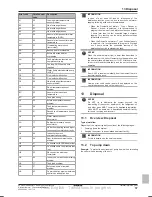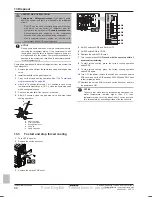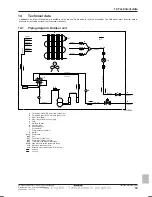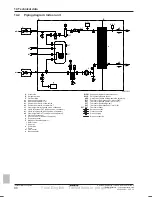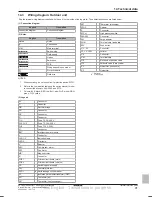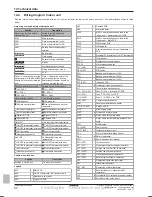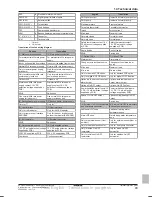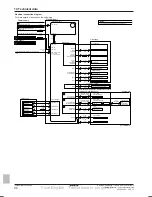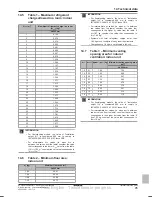
10 Hand-over to the user
Installer reference guide
80
ERGA04~08DAV3(A) + EHVH/X04+08S18+23DA
Daikin Altherma – Low temperature split
4P495248-1 – 2017.12
3
Program the schedule:
To add a new step, select an empty line and change
its value. To delete a step and all steps below it,
decrease the duration to "–".
—
▪ Scroll through the schedule.
▪ Adjust the duration (between 1 and 72 hours) and
temperatures (between 15°C and 55°C).
4
Press the left dial to save the schedule.
To perform an underfloor heating screed dryout
Conditions:
Make sure all operation is disabled. Go to the
Operation menu and turn off Room, Space heating/cooling and Tank
operation.
1
Set the user permission level to Installer. See
"To
change the user permission level" on page 47
.
—
2
Go to [A.4]: Commissioning > UFH screed dryout.
3
Set a dryout program: go to Program and use the
UFH screed dryout programming screen.
4
Select OK to confirm.
Result:
The underfloor heating screed dryout starts.
It stops automatically when done.
To stop the test run manually:
—
1
Go to Stop UFH screed dryout.
2
Select OK to confirm.
To read out the status of an underfloor heating
screed dryout
Prerequisite:
You are performing an underfloor heating screed
dryout.
1
Press .
2
A graph highlighting the current step of the screed dryout
schedule, the total remaining time, and the current desired
leaving water temperature will be displayed.
Press the left dial to access the menu structure and view the status
of sensors and actuators and to adjust the current program.
To stop an underfloor heating screed dryout
When the program is stopped by an error, an operation switch off, or
a power failure, the U3 error will be displayed on the user interface.
To resolve the error codes, see
"12.4 Solving problems based on
error codes" on page 86
.
1
Start in the UFH screed dryout screen.
—
2
Open the menu and select Stop UFH screed dryout.
3
Select OK to confirm.
Result:
The underfloor heating screed dryout is
stopped.
When the program is stopped due to an error, an operation switch-
off, or a power failure, you can read out the underfloor heating
screed dryout status:
1
Go to [A.4.3]: Commissioning > UFH screed dryout >
Status
2
You can read out the value here: Stopped at + the
step where the underfloor screed dryout was
stopped.
—
3
Modify and restart the execution of the program.
—
10
Hand-over to the user
Once the test run is finished and the unit operates properly, please
make sure the following is clear for the user:
▪ Fill in the installer setting table (in the operation manual) with the
actual settings.
▪ Make sure that the user has the printed documentation and ask
him/her to keep it for future reference. Inform the user that he can
find the complete documentation on the url as earlier described in
this manual.
▪ Explain the user how to properly operate the system and what to
do in case of problems.
▪ Show the user what to do in relation to maintaining the unit.
▪ Explain the user about energy saving tips as described in the
operation manual.
11
Maintenance and service
NOTICE
Maintenance MUST be done by an authorized installer or
service agent.
We recommend performing maintenance at least once a
year. However, applicable legislation might require shorter
maintenance intervals.
NOTICE
In Europe, the
greenhouse gas emissions
of the total
refrigerant charge in the system (expressed as tonnes
CO
2
-equivalent) is used to determine the maintenance
intervals. Follow the applicable legislation.
Formula to calculate the greenhouse gas emissions:
GWP value of the refrigerant × Total refrigerant charge [in
kg] / 1000
11.1
Overview: Maintenance and
service
This chapter contains information about:
▪ The yearly maintenance of the outdoor unit
▪ The yearly maintenance of the indoor unit
11.2
Maintenance safety precautions
DANGER: RISK OF ELECTROCUTION
DANGER: RISK OF BURNING
NOTICE: Risk of electrostatic discharge
Before performing any maintenance or service work, touch
a metal part of the unit in order to eliminate static electricity
and to protect the PCB.
11.3
Checklist for yearly maintenance
of the outdoor unit
Check the following at least once a year:
▪ Outdoor unit heat exchanger.
The heat exchanger of the outdoor unit can get blocked up due to
dust, dirt, leaves, etc. It is recommended to clean the heat
exchanger yearly. A blocked heat exchanger can lead to too low
pressure or too high pressure leading to worse performance.
Final English - Tanslations in progress

